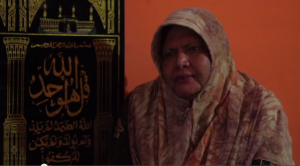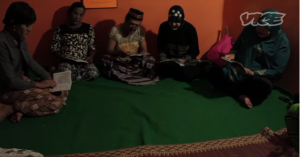An article in the Jakarta Post last week followed the latest developments on a pesantren (Islamic boarding school) for transgender people in Yogyakarta, Indonesia. Although it is called a boarding school, the Pondok Pesantren Waria Al-Fatah functions more like a religious school where students can learn classical religious subjects like fiqh and Qur’an recitation, as well as a community centre where students gather to break the fast together during Ramadan.
It was opened in 2008 by the late Maryani, who previously studied for 15 years under a religious teacher who did not differentiate her from his other students even after he found out that she was transgender. Maryani’s story was later recorded in a documentary The Warias: Indonesia’s Transsexual Muslims by Hannah Brooks, and reviewed by MMW’s Eren.
The term waria is a combination of the words for woman (wanita) and man (pria). Although it functions as an umbrella term for effeminate men, gay men, intersex individuals and transgender people, the term is used usually for transgender women. An analysis by MMW’s Alicia on how religious expression is a privilege for cisgendered Muslim women in Indonesia shows that the acceptance of transgender Muslims is still not widespread – the waria Islamic school is the first and only one of its kind in Indonesia and possibly the world.

An extremely marginalised community, many waria have no families and no legal identities. In life, many are forced to work as sex workers, though street singing (similar to the hijra of India) is becoming a more popular option. Those who go unclaimed after death are buried in mass graves, while others face the issue of whether in the funeral and burial rites they will be treated as men or women. Many waria hijabis may have their headscarves forcibly taken off them, or forbidden from entering mosques. The school’s practices provide examples of how gender expression surfaces in many aspects of religious life. According to Maryani,
“We provide sarung and mukena for prayer. Up to them to wear whatever they are more comfortable praying in, they are free to do so.” [translated from Indonesian]
After Maryani’s death in March this year, the school shifted from Notoyudan to Kotagede in Yogayakarta, reopening in the home of LGBT activist Shinta Ratri. Speaking at the opening ceremony, the head of a local interfaith organisation Abdul Muhaimin said,
“Everyone has the right to observe their religion in their own way (…) According to the Qur’an, we are not allowed to classify people based on economic, social, political, gender or theological values (…) I hope the students here are strong as they must face stigma in society. We have to care for them.” [translated from Indonesian]
From running solely on donations and the personal income of its founder Maryani, the school is now supported by Nahdlatul
Ulama University of Jepara in central Java. The respectful tone of the article was probably partly due to the recognition of the school by one of the two biggest mainstream Indonesian Islamic socio-religious organisations, as being as legitimate as any other Islamic school in the country.
However, when this news was published on the website OnIslam on the same day, the tone changes. First, the pesantren is termed a “so-called Islamic school” and the adjective “Islamic” is placed in quotation marks in the headline. The article also uses the outdated term “hermaprodites[sic]” to refer to intersex people (although why they are talking about intersex individuals in the context of transgender peoplealso says something about their own awareness of the issue).
The OnIslam article used the pronoun “he” in their articles to refer to the Maryani, the founder of the school (changing it from the feminine pronouns used by The Jakarta Post). Perhaps they didn’t know that Maryani is a feminine name, or perhaps they were confused by the translation of the Indonesian gender-neutral pronoun (dia), or perhaps they wanted to illustrate the supposed deviance and absurdity of transgender Muslims.
Maryani had received local and international media attention since 2008 when he transformed his home into a place for transgenders to study Islam. He also made headlines last year after he failed to make pilgrimage to Makkah in Saudi Arabia due to documentation problem[s]. His dream eventually came true when he flew to Makkah in April 2013 to perform umrah, performing all the pillars covered as a woman [emphasis mine].
Using the preferred pronouns is more than a stylistic choice. Imposing a gender identity on transgender Muslims is the exact opposite of what the waria are trying to do: claim Islam as their religion, and to claim God as their God, too. I hope opponents – local and abroad – of this school will keep in mind these words from the late Maryani:
“Here we teach our friends to worship God. People who worship are seeking Paradise, this is not limited by our sex or our clothing. Those who will enter Paradise are those who believe in Allah (swt).” [translated from Indonesian]












